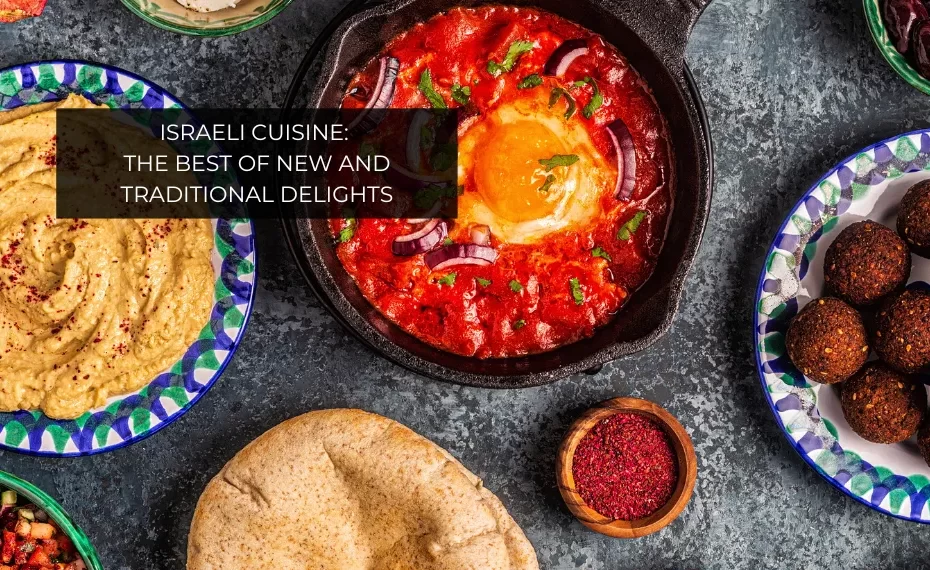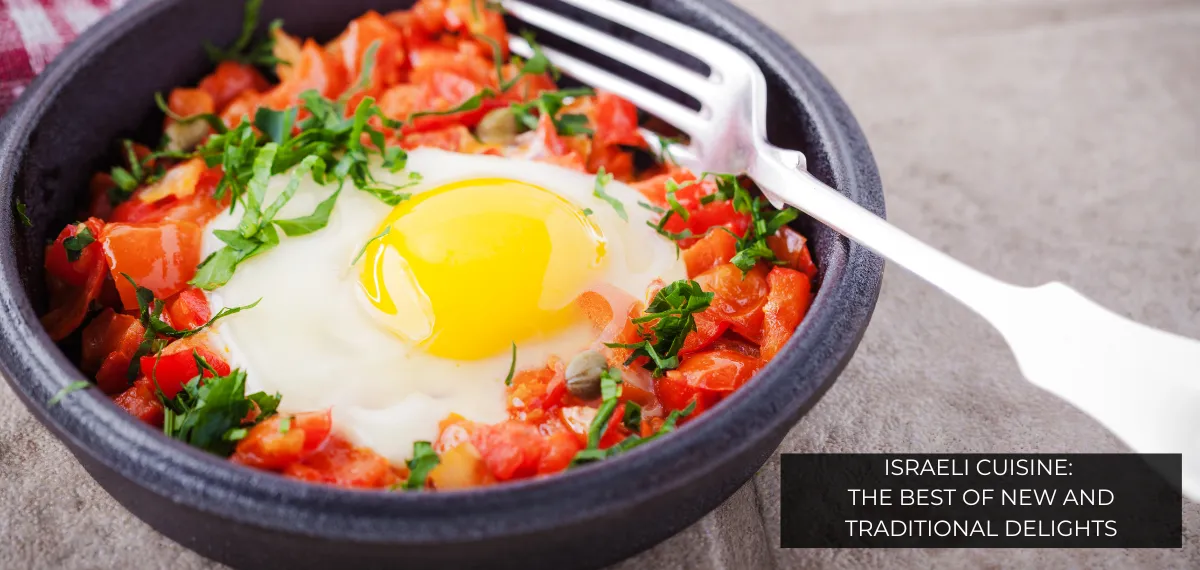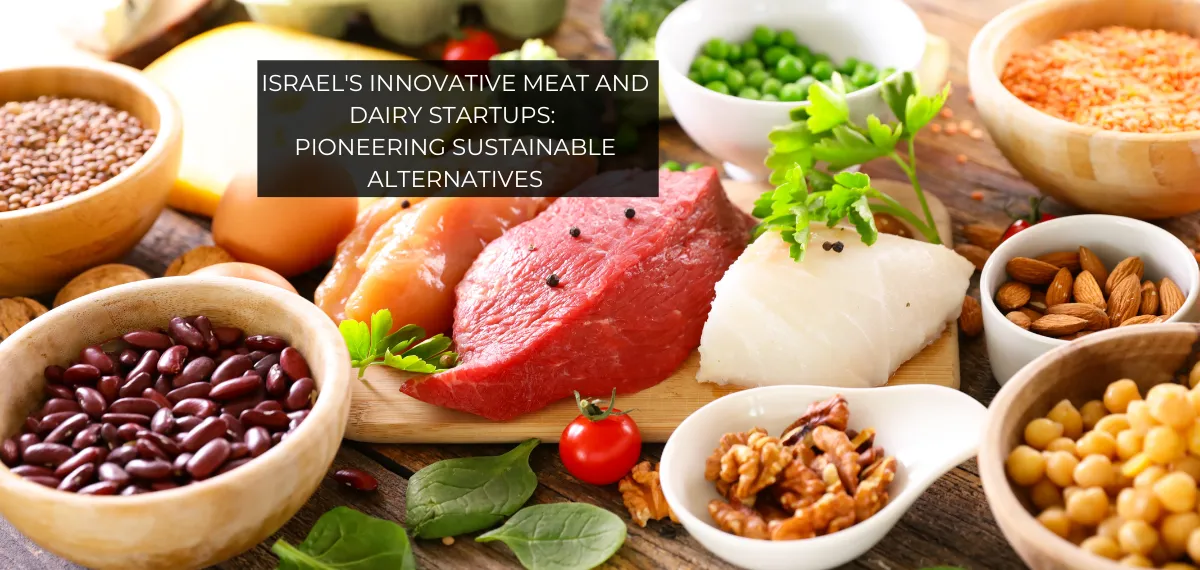Israel has a unique and diverse culinary culture that blends the old and new, combining traditional recipes with innovative twists. With influences from Jewish, Arabic, and Mediterranean cuisine, Israeli food has a distinct and flavorful character that has gained popularity worldwide. In this article, we’ll explore some of the best new and traditional delights of Israeli cuisine.
Do you understand what is the beauty of Israeli food / Israeli cuisine? Or do you have any idea about the Mediterranean diet? Well, it’s not by chance that Israel is considered among the top healthy countries around the globe.
We embrace the growing superfoods that fuel us. Our diverse populations mean that foods from all over Europe have become absolute staples in every kitchen.
A Fresh And Healthy Start To The Day: Israeli Breakfast
So, Israel is number one on a list of the world’s most healthy nations. Hummus, tomato, cucumbers, extra virgin olive oil … and other staples are on virtually every Israeli plate.
Therefore, Israel is #1 on a new ranking of countries with the lowest rate of diet-related deaths worldwide.
Mediterranean diet & Israeli cuisine
The healthful foundation of Israel’s way of eating is common to all countries bordering the Mediterranean Sea. Israel has a rich culinary history influenced by the Mediterranean diet and various cultural traditions. The Mediterranean diet, renowned for its health benefits, emphasizes the consumption of whole foods, including fresh fruits and vegetables, whole grains, lean protein, and healthy fats.
Israeli cuisine is known for its use of fresh herbs, spices, and vegetables, as well as its incorporation of Middle Eastern and North African flavors. The Mediterranean diet encourages moderate amounts of fish and poultry, as well as a low intake of dairy products (primarily yogurt and cheese), red and processed meats, and sweets.
Israeli cuisine offers a unique blend of flavors and cultural traditions, making it a must-try for food enthusiasts. Whether you’re enjoying traditional dishes or new Israeli cuisine delights, the Mediterranean-inspired diet is sure to satisfy your taste buds and provide numerous health benefits.
Salad with breakfast, lunch, and dinner
Freshly chopped salad is the cornerstone of all Israeli meals. The most basic Israeli salad begins with locally grown cucumbers and tomatoes, dressed with herbs, sea salt, extra-virgin olive oil (the only kind available here), and fresh-squeezed lemon juice.
Big breakfasts in Israeli cuisine
If you’ve ever enjoyed a traditional buffet at a hotel or restaurant, you know what we’re talking about. In Israeli cuisine, breakfast is considered the most important meal of the day, and it is often a big and hearty affair. The traditional Israeli breakfast is a delicious spread of salads, cheeses, bread, and eggs, served with hot and cold beverages. It is a fusion of flavors from different cultures, reflecting the diverse cultural heritage of the country.
Hummus, hummus in Israeli cuisine
If you don’t see a plate of homemade hummus at mealtime, you’re probably not in Israel. Hummus is a delicious and nutritious creamy paste made from protein-rich chickpeas, sesame tahini, sea salt, and lemon juice.
Tahini
Tahini is a condiment made from toasted, ground sesame seeds. It is a staple ingredient in many Middle Eastern and Mediterranean cuisines, including those of Israel. Tahini is versatile and can be used in a variety of dishes, including hummus, salad dressings, sauces, and even desserts.
Tahina, also known as tahini, is a good source of healthy fats, protein, and minerals like calcium and iron. It is also rich in antioxidants and has anti-inflammatory properties. Due to its nutritional value, tahini is often used as a vegan substitute for dairy products such as cream or cheese.
Tahini (tahina to Israelis), ground sesame seeds, is not only an essential ingredient in hummus but has pride of place in Israeli cuisine as the basis of an all-purpose dip and dressing.
Pomegranates
The regal red pomegranate is one of the seven indigenous crops mentioned in the Bible (the others are wheat, barley, grapes, olives, figs, and dates), and it serves as a visual symbol of Israel itself.
Pomegranate seeds (the edible part of the fruit) guard against cancer and heart disease, boost immunity, and reduce chronic inflammation. Gastric distress, hot flashes, hemorrhoids, conjunctivitis, osteoarthritis, hypertension, and high cholesterol are some of the ailments pomegranate seeds are believed to ease.
Tomatoes and Cherry tomatoes in Israeli cuisine
Israelis don’t consider a salad to be a salad unless it includes chopped tomatoes.
Along with vitamins and minerals, tomatoes contain lycopene, a carotenoid phytonutrient that gives them their red color. Lycopene is a powerful antioxidant beneficial for the heart, blood pressure, prostate, bones, and skin. Our bodies absorb lycopene most effectively when tomatoes are consumed with a source of oil, such as olive oil or cheese.
The benefits of a hearty breakfast have been proven in several Israeli studies, which reveal that eating more in the morning and less in the evening suppresses blood sugar surges, eases weight loss, and helps diabetics avoid insulin resistance.
Olive Oil
Unrefined extra-virgin olive oil is the foundation of the Mediterranean diet, and therefore a staple in Israeli cooking.
Olive oil is rich in healthy monounsaturated fats and contains a variety of powerful antioxidants. Some of the health benefits associated with olive oil consumption include:
-
- Reduced risk of heart disease: Olive oil has been shown to lower blood pressure and reduce the risk of heart disease.
- Improved brain function: The antioxidants in olive oil can improve brain function and reduce the risk of cognitive decline.
- Reduces inflammation: Olive oil possesses anti-inflammatory properties that can help alleviate inflammation throughout the body.
- Lower risk of certain types of cancer: Studies have shown that regular consumption of olive oil may reduce the risk of certain types of cancer, including breast and colon cancer.
Dates and date honey (silan)
In Israeli cuisine, dates and date syrup (also known as silan) are used in a variety of dishes, both sweet and savory. Silan is often used as a glaze for roasted vegetables, such as carrots or sweet potatoes. It can also be used as a sweetener in salad dressings, marinades, and sauces. Dates are commonly used in Middle Eastern desserts, such as halva and baklava. They are also a popular ingredient in smoothies and energy bars.
Israelis love locally grown dates, and this superfruit loves us back: dates protect against heart attack and stroke by lowering blood triglyceride levels, stabilizing blood pressure, and providing a good dose of antioxidants, vitamins A and B, protein, and dietary fiber.
Shakshuka
Shakshuka is a dish of Northern African origin and is an excellent option for breakfast meals. The dish is elegant in its simplicity, yet it has endless variations. At its core, shakshuka is made by poaching eggs in a skillet filled with a bubbling tomato stew of peppers, onions, herbs, and spices (it’s popular for breakfast and brunch)
6 Israeli Startups That Are Revolutionizing the Meat and Dairy Industry – You Won’t Believe What They’re Doing!
Israel has gained recognition as a hotspot for innovative startups in various industries, including the meat and dairy sectors. Specifically, in the realm of meat and dairy, Israeli entrepreneurs and scientists are at the forefront of developing alternative and sustainable solutions to address the challenges associated with conventional animal agriculture.
These startups are driven by the growing demand for more sustainable, ethical, and environmentally-friendly food options. By leveraging technological advancements and scientific expertise, they aim to revolutionize the production of meat and dairy products, offering alternatives that have a reduced environmental impact and improved animal welfare.
The focus of these Israeli startups is on developing alternative sources of protein that can serve as substitutes for traditional meat and dairy products. They explore various approaches, including plant-based alternatives, lab-grown or cultured meat, and fermentation techniques, to create dairy-like products.
Israel's strong foundation in technology, research, and entrepreneurship has provided a conducive environment for these startups to flourish. The country is home to renowned academic institutions, research centers, and a supportive ecosystem that fosters innovation and collaboration.
Startups in Israel's meat and dairy industries are driven by a shared vision of creating a more sustainable and ethical food system. They aim to reduce the environmental footprint associated with traditional animal agriculture, including land use, greenhouse gas emissions, and water consumption. Additionally, they seek to address concerns related to animal welfare, food safety, and the need for more efficient and scalable food production methods.
Through their cutting-edge technologies, these startups are pushing the boundaries of what is possible in the food industry. They are not only focused on developing products that replicate the taste, texture, and nutritional profile of conventional meat and dairy but also strive to make them more accessible and affordable to consumers.
By pioneering alternative and sustainable solutions, Israeli startups are not only contributing to the global shift toward more environmentally friendly and ethical food choices but also positioning Israel as a leader in innovative food technologies.
Israeli Food Technology Companies to Watch in 2025/2026
| Startup | Description |
|---|---|
| Aleph Farms | Pioneering the field of lab-grown meat, Aleph Farms produces real meat without traditional animal farming, aiming to lower the environmental impact of meat production. |
| Redefine Meat | Uses advanced 3D printing technology to create realistic plant-based meats, combining plant ingredients for authentic taste, texture, and appearance. |
| SuperMeat | Focuses on developing cultured chicken meat by growing real chicken cells in lab settings. Promotes sustainability and cruelty-free meat production. |
| Future Meat Technologies | Develops scalable, affordable cultured meat solutions. Their mission is to make lab-grown meat accessible while solving cost and production challenges. |
| Imagindairy | Uses microbial fermentation to produce animal-free dairy proteins that replicate the taste and texture of traditional dairy, offering sustainable alternatives. |
| InnovoPro | Specializes in chickpea-derived, plant-based proteins. Their innovative process extracts highly functional, sustainable proteins ideal for meat and dairy alternatives. |
| These Israeli startups lead a global movement toward ethical, eco-conscious food production. By innovating in cultured meat and plant-based protein, they support reduced animal agriculture, improved sustainability, and greater consumer choice. Their work reinforces Israel's status as a food tech innovation hub. | |



Thanks for sharing. Nice article
From Hummus to Shawarma. I love
Israeli Cuisine Is a Big Hit in Europe
I recently tried the Sabich sandwich, and it was amazing! It’s a popular street food in Israel, and it’s made with fried eggplant, hard-boiled eggs, hummus, tahini, and Israeli salad, all wrapped in a pita bread. It’s a perfect blend of flavors and textures, and it’s a must-try for anyone who loves Israeli cuisine.
It’s fantastic to see Israeli cuisine embracing more plant-based options!
The fusion of Israeli flavors with international cuisines is a fascinating development. It’s exciting to see chefs experiment with new combinations and create innovative dishes that appeal to a wider audience while preserving the essence of Israeli culinary heritage.
Wow, those dishes look amazing! Israeli cuisine is a treasure trove of delicious and healthy food. The Mediterranean diet is definitely the way to go.